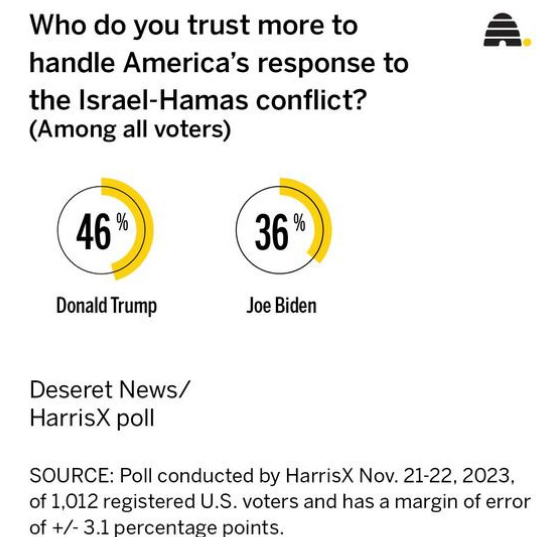New Poll: Voters trust Trump over Biden to navigate Israel-Hamas war

As the 2024 election nears, Alex Malkin, a Jewish student at the University of Alabama, views candidates’ positions on the Israel-Hamas war as the most important issue. “I’d consider myself almost a single-issue voter, and that’s going to be Israel,” he said.
But like one-third of American voters, he still hasn’t decided which presidential candidate he trusts most.
That’s according to a new Deseret News/Harris X poll of registered U.S. voters, which shows that 33% don’t know whether they think President Joe Biden, former President Donald Trump or other potential general election candidates have the best position on the ongoing conflict between Israel and Hamas.
But when offered just two options, Biden and Trump, the former president is the clear favorite of a plurality of Americans. Forty-six percent of respondents said they trust Trump to handle America’s response, compared to 36% who said Biden. Eighteen percent said they would trust someone else.
The poll was conducted Nov. 21-22 among 1,012 registered voters. The margin of error is +/- 3.1 percentage points.
Republican voters trust Trump over other GOP candidates to handle the war. When asked which Republican candidate has the best position on the war, 57% of GOP voters picked Trump.
Former United Nations ambassador Nikki Haley was the next choice, at 9%. Florida Gov. Ron DeSantis (6%) and entrepreneur Vivek Ramaswamy (4%) followed.
A SHIFT AMONG YOUNG VOTERS?
When presented a list of potential candidates — Trump, Biden, Green Party nominee Jill Stein, and independents Robert F. Kennedy Jr. and Cornel West — 35% of voters say Trump has the best position on the Israel-Hamas conflict, while 25% say Biden does.
With nearly a year until the general election, though, one-third of voters (33%) are still undecided. Among them are Malkin and Sam Sigal, two undergraduates at the University of Alabama, the site of the fourth Republican presidential debate on Wednesday.
Both Sigal and Malkin are Jewish, and the candidates’ positions on Israel are a key issue when voting. Sigal said foreign policy is “going to be a huge thing” that she considers, especially as related to Israel. They both consider themselves to be conservative, but they don’t necessarily affiliate with the Republican Party.
“For the longest time I’ve just said that I’m independent, because I don’t like how extreme both parties have gotten, especially recently,” Sigal said.
Neither has made up their mind as to who they’ll support in 2024. Malkin credits Trump for moving the U.S. embassy in Israel to Jerusalem and for recognizing Israel’s sovereignty in the contested Golan Heights region. But he was disappointed by Trump’s reaction when Netanyahu congratulated Biden for winning in 2020.
He also says he’s been “pretty happy” by Biden’s support for Israel during this war. So far.
Sigal agrees. “I’m going to have to hear them speak more, and see what other policies they have,” she said.
College-age Jews are overwhelmingly liberal — less than 1 in 5 U.S. Jews under the age of 30 describe themselves as “conservative,” according to Pew — but Sigal and Malkin see a potential shift, as opposition to Israel increases on the political left.
“I feel like a lot of young Jews are kind of at that junction where, historically, they’ve supported the Democratic Party and had more left wing views,” Malkin said. “But I know a lot of people who feel like they’re getting increasingly pushed out. And they’re like, ‘Do I go into the hands of the Republicans? Or do I just stay confused in the middle?’”

***

- Art
- Causes
- Analysis
- Cloak & Dagger
- Economy - Finance
- Health
- Literature
- Music
- Andere
- News & Politics
- Real Time Facts
- Sports



